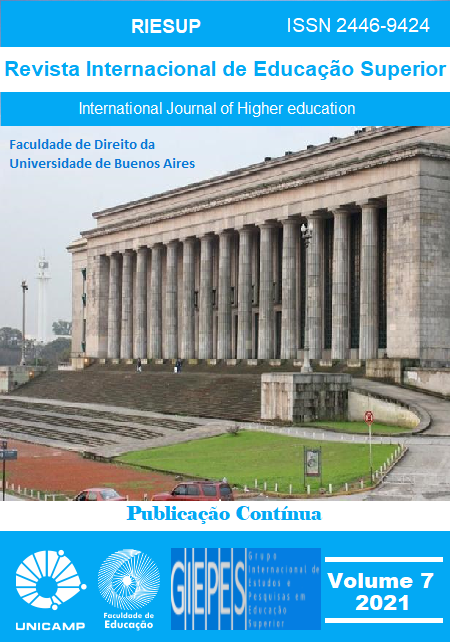Abstract
This article investigated the association between self-rated health and the socioeconomic,
demographic, physical, emotional, behavioral, and academic characteristics of students in the Pharmacy course at the Federal University of Minas Gerais. We used Data from the research Evaluation of the profile of students in the undergraduate course in Pharmacy at the Federal University of Minas Gerais, developed by the Structural Teaching Center (NDE). Health perception was measured using a scale that ranged from 0 to 100, with 0 being the worst health condition and 100 being the best possible health condition. The sample of 273 students was analyzed using the statistical technique called CART (Classification and Regression Tree). The general average of the health scale was 70.6 and the standard deviation was 20.13. A positive association was observed between the behavioral characteristics, the physical, and emotional aspects experienced by the students and the health scale. The factors most strongly associated with the students' health scale were sex and having or not having a job, in that order of intensity.
References
ALVES, João Guilherme Bezerra et al. Qualidade de vida em estudantes de Medicina no início e final do curso: avaliação pelo Whoqol-bref. Rev. bras. educ. med. Rio de Janeiro, v. 34, n. 1, p. 91-96, Mar. 2010.
BACCHI S, Licinio J. Qualitative Literature Review of the Prevalence of Depression in Medical Students Compared to Students in Non-medical Degrees. Acad Psychiatry, United States, v. 39, n. 3, p. 293-9, 2015.
BARROS, Marilisa Berti de Azevedo et al. Tendências das desigualdades sociais e demográficas na prevalência de doenças crônicas no Brasil, PNAD: 2003- 2008. Ciênc. saúde coletiva, Rio de Janeiro, v. 16, n. 9, p. 3755-3768, Set. 2011.
BRASIL. Ministério da Saúde. Secretaria de Vigilância em Saúde. Portaria nº 344 e suas atualizações, de 12 de maio de 1998. Aprova o Regulamento Técnico sobre substâncias e medicamentos sujeitos a controle especial. Diário Oficial da União, 31 dez. 1998.
BRASIL. Presidência da República. Casa Civil. Lei nº 12.711, de 29 de agosto de 2012. Dispõe sobre o ingresso nas universidades federais e nas instituições federais de ensino técnico de nível médio e dá outras providências. Diário Oficial da União, 30 ago. 2012.
BRASIL. Ministério da Educação. Resolução Nº 6, de 19 de outubro de 2017. Institui as Diretrizes Curriculares Nacionais do Curso de Graduação em Farmácia e dá outras providências. Diário Oficial da União, 20 out. 2017.
BREIMAN, Leo et al. Classification and Regression Trees. Reprint. CRC Press, 1998. p. 20-21
CUNHA, Marco Antonio Buch et al. Transtornos psiquiátricos menores e procura por cuidados em estudantes de Medicina. Rev. bras. educ. med., Rio de Janeiro, v. 33, n. 3, p. 321-328, Set. 2009 .
FÓRUM NACIONAL DE PRÓ-REITORES DE ASSUNTOS COMUNITÁRIOS E ESTUDANTIS (FONAPRACE). Perfil socioeconômico e cultural dos estudantes de graduação das universidades federais brasileiras. Brasília: Associação Nacional dos Dirigentes das Instituições Nacionais de Ensino Superior (Andifes); 2011.
INSTITUTO NACIONAL DE ESTUDOS E PESQUISAS EDUCACIONAIS ANÍSIO TEIXEIRA. Sinopse Estatística da Educação Superior 2010. Brasília: Inep, 2011. Disponível em: http://portal.inep.gov.br/basica-censo-escolar-sinopse-sinopse Acesso em: 14 ago. 2018.
INSTITUTO NACIONAL DE ESTUDOS E PESQUISAS EDUCACIONAIS ANÍSIO TEIXEIRA. Sinopse Estatística da Educação Superior 2016. Brasília: Inep, 2017. Disponível em: http://portal.inep.gov.br/basica-censo-escolar-sinopse-sinopse. Acesso em: 14 ago. 2018.
NÚCLEO DOCENTE ESTRUTURANTE (NDE). Base de dados. Avaliação do perfil dos alunos do curso de graduação em Farmácia da Universidade Federal de Minas Gerais. Belo Horizonte: Faculdade de Farmácia/UFMG, 2018.
OLIVEIRA, Nara Rejane Cruz de; PADOVANI, Ricardo Da Costa. Saúde do estudante universitário: uma questão para reflexão. Ciênc. saúde coletiva, Rio de Janeiro, v. 19, n. 3, p. 995-996, Mar. 2014.
OLIVER, Wesley et al. Alcohol use behaviors among pharmacy students. Am J Pharm Educ. vol. 12, n. 78. 2014
SAUPE, Rosita et al .Qualidade de vida dos acadêmicos de enfermagem. Rev. Latino-Am. Enfermagem, Ribeirão Preto, v. 12, n. 4, p. 636-642, Aug. 2004 .
BARALDI, Solange et al. AVALIAÇÃO DA QUALIDADE DEVIDA DE ESTUDANTES DE NUTRIÇÃO. Trab. educ. saúde, Rio de Janeiro, v. 13, n. 2, p. 515-531, Ago. 2015 .
SOUSA, Thiago Ferreira de; JOSE, Helma Pio Mororó; BARBOSA, Aline Rodrigues. Condutas negativas à saúde em estudantes universitários brasileiros. Ciênc. saúde coletiva, Rio de Janeiro , v. 18, n. 12, p. 3563-3575, Dec. 2013.
UNIVERSIDADE FEDERAL DE MINAS GERAIS (UFMG). Faculdade de Farmácia. Projeto Pedagógico do curso de Farmácia da UFMG. Versão V. Outubro de 2017.
VIEGAS ANDRADE, Mônica et al. Societal Preferences for EQ-5D Health States from a Brazilian Population Survey. Value in Health Regional Issues, United States, vol 2, n. 3, pp.405–412. 2016.
WERKEMA, Maria Cristina Catarino; AGUIAR, Sílvio. Planejamento e análise de experimentos: como identificar e avaliar as principais variáveis influentes em um processo. Belo Horizonte: Fundação Christiano Ottoni, Escola de Engenharia da UFMG, 1996. p. 54
WORLD HEALTH ORGANIZATION (WHO). Social Determinants of Health. Disponível em: http://www.who.int/social_determinants/en/Acesso em: ago. 2018.
WORLD HEALTH ORGANIZATION (WHO). Social Determinants of Health. Disponível em: http://www.who.int/social_determinants/en/. Acesso em: ago 2018.

This work is licensed under a Creative Commons Attribution 4.0 International License.
Copyright (c) 2021 Revista Internacional de Educação Superior


